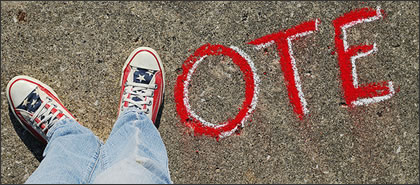It might seem like an undemocratic question but it’s one that’s always plagued me: why do I bother voting? Most people know their own tick in the box is hardly worth it when weighed against the effort involved in getting registered and actually going to vote, let alone when weighed against all the other people voting.
Quattrone & Tversky (1984) had a hunch that there was another, more complex psychological reason that people vote, to go along with the usual explanations. Not only, they guessed, do people vote because of their democratic duty and their participation in a shared social ritual, but the act of voting ourselves tells us how others are going to vote.
This doesn’t make much sense at first sight but the mind works in mysterious ways. People know there are others who think the same way they do and if people like them don’t vote then their candidate is unlikely to win. Therefore they need to vote themselves.
It sounds like a twisted kind of logic but Quattrone & Tversky found some evidence for it in a study following on from the one they did about self-deception (see the connection?!). They found that in a simulated voting situation participants behaved as though they believed that their own vote actually caused other people to vote in the same way they did.
In other words, people seem to behave as though their own behaviour is diagnostic of other people who think the same way.
This is another neat demonstration of our powers of self-deception and one reason self-deception can work to society’s advantage. Democracies generally view voting as a good thing (with some notable exceptions!) and try to encourage it, yet people rationally understand that their individual vote makes practically no difference. But when we see our vote as signalling how others will behave, it becomes much more important.
There are many other areas of our lives where seemingly insignificant actions by individuals are multiplied to produce extremely beneficial outcomes. For example when we give money to charity we may only be able to afford a small amount; rationally we understand it won’t make much difference, but when this money is combined with all that given by like-minded people, the total amount becomes very worthwhile.
The same probably goes for any number of other prosocial behaviours in which we assume our own behaviour is diagnostic of others. It’s one of the unexpected benefits of our penchant for self-deception: sometimes our own narcissism works to society’s advantage.

